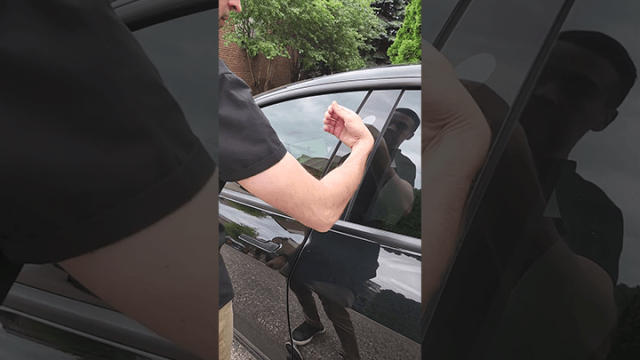Back in 2012, a young Steve read a piece from The Verge about body hacking. It opened with an anecdote about a piercing shop in Pittsburgh that was implanting neodymium magnets into people’s fingertips, with nothing but ice cubes for anesthetic. This, to my fifteen year old brain, was the coolest thing in the world.
Of course, my parents forbade me from heading to Pittsburgh for the procedure (as if I could, without a car or licence), and they were probably right to do so — those magnets weaken over time, leaving your sixth sense gone and only scar tissue in your fingers to show for the effort. But the concept of body modification, of taking this rickety assemblage of organic matter and making it better, more capable, never left my mind.
So when someone implants an experimental chip in their arm to act as a car key, I get it. The video below is timestamped to show the chip’s function and skip the procedure of implanting it, but be warned that the first 31 seconds of the clip show a man’s hand being surgically cut open to place a microchip inside.
OK, “experimental” may be a bit much. The chip is a multipurpose NFC chip, currently in beta testing but soon to be a production model. The tester is Brandon Dalaly, a Tesla owner and apparent body modification enthusiast. And while his chip is a new design, he’s far from the first to implant Tesla-controlling hardware in his body.
Back in 2019, USA Today ran a story about software engineer and body modder Amie D.D. and her Tesla-compatible upgrade, calling it a “bloody hack.” Amie D.D.’s work long predates Dalaly’s beta chip, so she took an alternate approach — ripping the NFC tag from her car’s wallet-style key, and having it encased in a bio-safe polymer before implanting it in her arm.
Amie DD worked with a company called VivoKey to make the NFC chip implantable, leading to a product called the TeslaFlex that could be purchased from noted biohack shop Dangerous Things. But the TeslaFlex had issues: It could only unlock the Tesla, not operate it.
See, Tesla keys run a bit of software called a Java Card, used for secure communications between the card and car. So VivoKey went back to the drawing board, developing a new implantable chip capable of running those applets. The result? The VivoKey Apex — the same beta chip that Dalaly installed and demonstrated.
Sure, using the back of your hand to unlock your car isn’t much more convenient than a key or phone. But the idea of extending the human body, making it capable of things far beyond what evolution or biology can muster, is still incredibly interesting and appealing. If we’re going to live in a cyberpunk dystopia, we may as well get the fun high-tech benefits.
